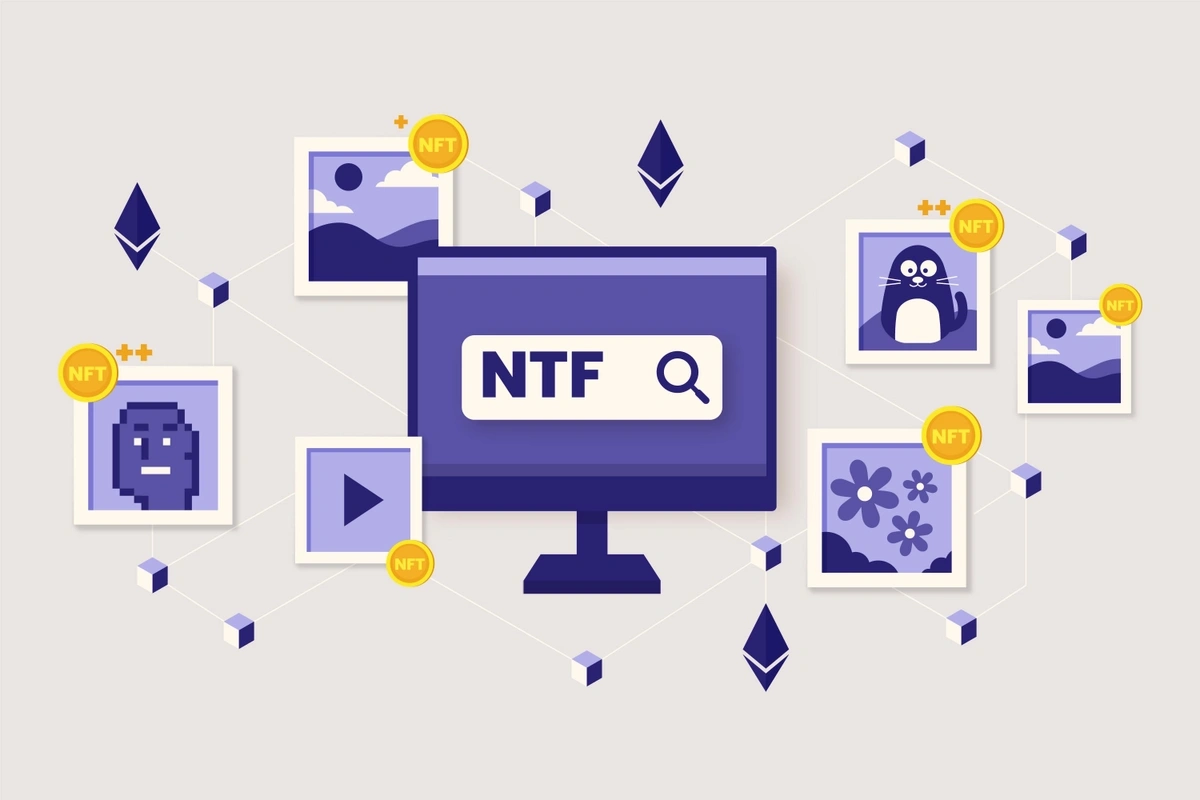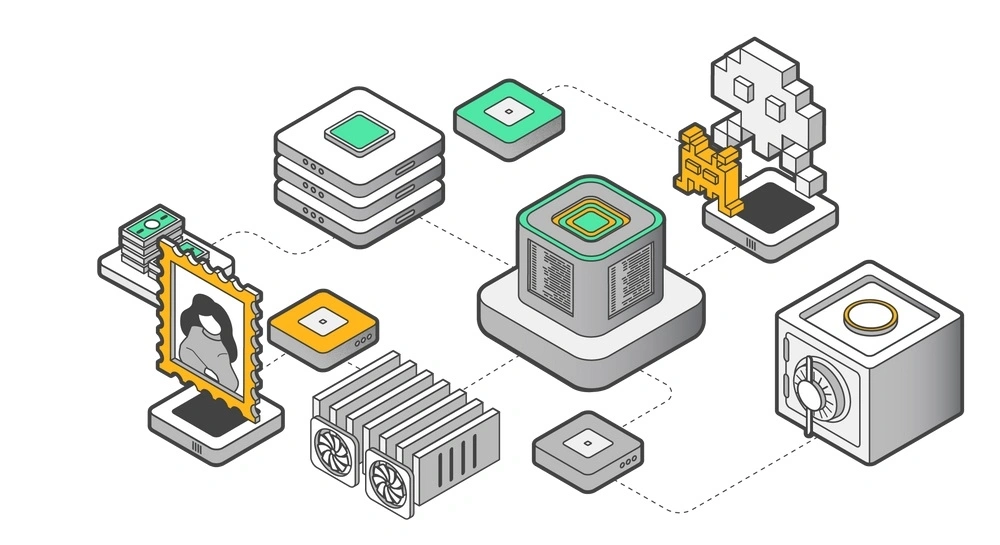Blockchain technology has gained massive popularity in recent years due to its decentralized, secure, and transparent nature. One of the fundamental components of a blockchain network is a node, which plays a crucial role in maintaining the network’s integrity and decentralization.
Blockchain Node Providers & How They Work
As a beginner in blockchain, it’s important you understand the inner workings of the network for you to grasp a full understanding of blockchain ecosystems. Without nodes, every blockchain network collapses – they’re that important.
In this blog post, we will discuss what a blockchain network is, what a blockchain node is, how you can deploy a node, and why you might need a blockchain node provider.
So, let’s get to it.
What Is A Blockchain Network?
A blockchain network is a decentralized ledger of transactions, where each block of data is linked to the previous block and secured using cryptography. The data stored on a blockchain network is distributed across a network of nodes, making it resistant to tampering and fraud. This makes blockchain technology ideal for use cases such as digital currencies, supply chain management, and secure data transfer.
What Is A Blockchain Node?
A blockchain node is a computer that connects to a blockchain network. Nodes store a copy of the blockchain and validate transactions, ensuring that they conform to the network’s rules and protocols. Also, Nodes help to broadcast transactions and add new blocks to the rest of the network.
Blockchain nodes are the backbone of blockchain's trustworthiness and security. By storing, processing, and disseminating data, nodes provide a consensus mechanism, ensuring that the blockchain remains a single source of truth, resistant to fraud and tampering.
Types of Blockchain Nodes
Full Nodes
- Maintain a complete copy of the blockchain ledger, crucial for validating transactions and blocks.
- Provide the highest level of security and independence in the network by storing the entire blockchain.
- Require substantial storage space, processing power, and bandwidth due to the extensive blockchain data they manage.
Light Nodes
- Store only essential data needed to validate transactions, such as block headers.
- Rely on full nodes for additional information, making them efficient for devices with limited resources.
- Suitable for users who need to interact with the blockchain network but cannot run a full node.
Mining Nodes (in PoW Networks)
- Responsible for creating new blocks through cryptocurrency mining, a process involving solving complex cryptographic puzzles.
- Play a pivotal role in maintaining the network's security and integrity.
- Require specialized, high-performance hardware like ASICs or powerful GPUs.
Validator Nodes (in PoS Networks)
- Validate transactions and create new blocks in Proof of Stake (PoS) systems.
- Selected based on the amount of cryptocurrency they hold and are willing to 'stake'.
- Earn rewards for their service to the network, which often includes a share of transaction fees or gas fees, incentivizing them to maintain network integrity and consensus.
Archival Nodes
- Store the entire blockchain ledger, including all historical states, encompassing transactions, account balances, and contract states.
- More resource-intensive than running a full node, requiring significant storage for the complete blockchain history.
- Essential for detailed network analysis, historical data retrieval, and services requiring full blockchain history access.
Pruned Full Nodes
- Pruned nodes have a set memory capacity for data storage, storing only a limited number of blocks.
- They manage ledger space by deleting the oldest blocks while keeping their sequence and metadata.
- These nodes are useful for users who need to run a full node but have limited storage capacity.
Authority Nodes
- Authority nodes play an administrative role in certain blockchain networks.
- They authorize other nodes to join the network and can define access permissions for data channels.
- These nodes are key to maintaining network security and administrative control.
Masternodes
- Masternodes are specialized full nodes that validate transactions and perform additional tasks.
- They are involved in network governance, enabling advanced features like instant transactions and enhanced privacy.
- Masternodes are crucial in networks that require functionalities beyond basic transaction processing.
Lightning Nodes
- Operate in the Lightning Network to enable faster, off-chain transactions.
- Establish payment channels for near-instantaneous transactions, improving scalability and reducing fees.
- Suitable for scenarios requiring quick settlement, such as microtransactions or retail purchases.
Super Nodes
- Super nodes fulfill specialized roles often involving network governance and regulation.
- They maintain network regulations, implement upgrades, and perform tasks requiring high authority.
- Essential for the smooth operation and evolution of blockchain networks.
Each type of node serves a unique and vital role within the blockchain network, contributing to its functionality, security, and integrity. The choice of node largely depends on an individual's or organization's capacity, technical skill, and their intended role in the blockchain ecosystem.
How Do You Deploy A Blockchain Node?
Deploying a blockchain node is a critical process that requires careful planning and execution. Here’s a more in-depth look at each step:
1. Choose the Node Type
Before you can deploy a node, you need to select which types you’re going to create. This will determine your deployment process. Your type of project, the blockchain network you’re using, and your technical skills will contribute to your choice.
2. Determine the Deployment Method
Self-Hosting: Offers complete control over your node. Requires a dedicated computer or server, and an uninterrupted power supply and internet connection. Suitable for tech-savvy individuals or organizations with the necessary infrastructure.
Cloud Hosting: A more user-friendly option, cloud hosting services provide the necessary hardware and software resources over the internet. This method reduces the burden of maintenance and physical infrastructure but involves monthly or annual fees and slightly less control over the node.
3. Prepare Necessary Resources
Storage: Full nodes require significant storage space, often several hundred gigabytes or more, to store the entire blockchain. Light and archival nodes have different storage requirements.
Computing Power: Mining and validator nodes need powerful processors to handle computational tasks efficiently. Standard nodes can operate on less powerful processors.
Bandwidth: A stable and fast internet connection is crucial for all nodes to stay synchronized with the blockchain network.
4. Install and Configure Software
Selecting Software: Choose the appropriate node software based on the blockchain network you wish to join. Popular blockchain networks like Bitcoin and Ethereum have specific node software.
Installation: Follow the software provider's guidelines to install the node software on your machine or server.
Configuration: Configure the node software to connect to the desired blockchain network. This might include setting up a wallet, choosing a blockchain data directory, and configuring port settings for network communication.
5. Join the Network
Synchronization: Once installed and configured, the node will start synchronizing with the blockchain network. This process involves downloading and verifying the blockchain's history, which can take several hours to several days, depending on the blockchain size and network speed.
Participation: After synchronization, your node becomes a functioning part of the blockchain network. It will start validating transactions and, depending on its type, may participate in creating new blocks or securing the network.
Ensuring Ongoing Node Operations
To keep your node active, you should regularly monitor it to ensure it remains synchronized with the network. Software updates, security patches, and occasional hardware upgrades may be necessary to keep the node operational and secure.
Additionally, you should implement robust security measures to protect your node from cyber threats. This includes using firewalls, securing your internet connection, and keeping your node software up-to-date.
Deploying and maintaining a blockchain node is a commitment that requires technical knowledge, resources, and ongoing management. Whether you choose to operate a full, light, mining, validator, or archival node, each plays a vital role in maintaining the blockchain network's integrity and functionality.
What Is A Blockchain Node Provider?
A blockchain node provider is a company that offers services related to the deployment, maintenance, and management of blockchain nodes. Node providers offer a range of services, including node deployment, technical support, and network monitoring. They help to make the process of deploying a node easier and more cost-effective, as they take care of the technical details and provide the necessary resources to run the node.
There are several types of blockchain node providers, including public, private, and consortium.
Public node providers offer nodes to the public, allowing anyone to connect and use the network.
Private node providers offer nodes to a closed group of users, usually for enterprise use cases.
Consortium node providers offer nodes to a specific consortium of users, such as financial institutions.
Why Do You Need A Blockchain Node Provider?
There are several reasons why you might need a blockchain node provider. Firstly, using a node provider can help you save on setup and running costs. You don't have to worry about buying and maintaining hardware, which can be expensive or worrying about security and data backup.
Secondly, node providers offer technical support, which can be especially important for those who are new to blockchain technology. They can help you troubleshoot issues, provide updates and upgrades, and ensure the node is running smoothly.
Thirdly, node providers supply network monitoring. They can detect and resolve potential issues, such as network congestion or node failures quickly and efficiently, ensuring that the network is always available and secure.
Frequently Asked Questions
How do blockchain nodes communicate?
Blockchain nodes utilize a peer-to-peer network protocol to discover and connect with each other, ensuring a robust and distributed network.
Downsides to becoming a blockchain node provider?
Challenges include the cost of equipment and maintenance, the need for continuous network connectivity, and the risk of security vulnerabilities.
What are some security considerations for running a blockchain node?
Security measures are crucial for nodes. These include regular software updates, secure internet connections, and protective measures against cyber threats.
What happens if a node goes offline?
When a node goes offline, it temporarily loses the ability to participate in network activities. However, the decentralized nature of blockchain ensures overall network stability.
How do blockchain nodes find each other?
Nodes find each other using network protocols and a list of known IP addresses, enabling them to connect and communicate within the blockchain network.
How many blockchain nodes are there?
The number of nodes varies by blockchain, with major networks like Bitcoin and Ethereum having thousands of nodes. This number changes as nodes join or leave the network.
How to become a blockchain node?
To become a node, install the required blockchain software on a compatible computer or server, download the blockchain ledger, and connect to the network. Technical knowledge is often necessary for setup and maintenance.
What is a validator node in blockchain?
A validator node in a Proof of Stake (PoS) blockchain validates transactions and creates new blocks. Validators are chosen based on their cryptocurrency stake and receive rewards for maintaining network integrity and consensus.
Summarizing Blockchain Nodes
Blockchain nodes are an essential component of a blockchain network, and blockchain node providers ensure they function smoothly. By using a blockchain node provider, you can save costs while benefiting from technical support and network monitoring.
Whether you're an individual or an enterprise, a blockchain node provider can help you get started with blockchain technology and unlock its full potential.
Are you equipped to get started with blockchain technology? Zert’s ground-breaking digital wallets, payment systems, and first-of-its-kind digital asset safe deposit box give retail investors a level of security usually reserved for institutions.





